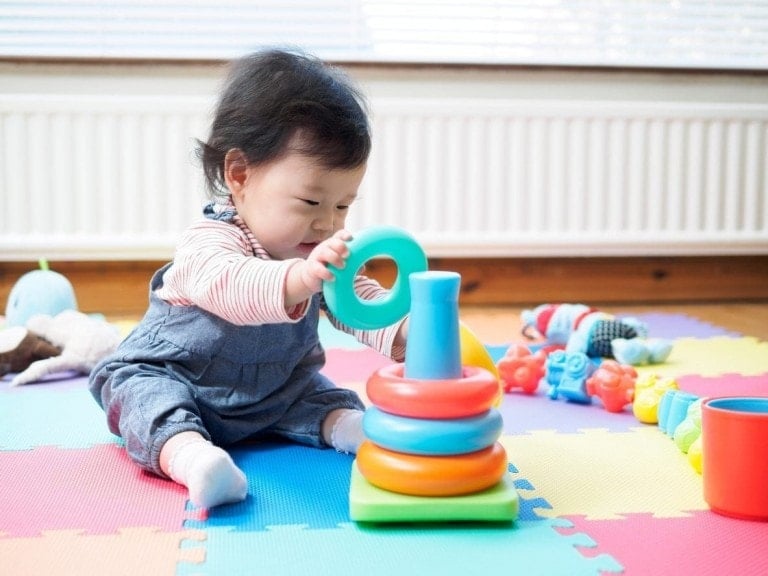So you just announced you’re pregnant to your friends and family last night. Today, your mother-in-law texts asking if you’d like some nursery bedding she has picked out for her new grandbaby. As well as a crib. Car seat. And first Christmas outfit.
The bedding is cute but not cute enough to help you overlook the sudden panic in your gut that you might have a grandma-zilla on your hands. You call your hubby to tell him about his mom, and right then, your doorbell rings. A year’s supply of diapers is on your doorstep with a note that reads: FROM BABY’S FAVORITE GRANDMA.
You then find yourself running to the bathroom to puke. And cannot tell if the nausea is morning sickness or overbearing grandma flu, which are hard to tell apart because they both come on suddenly and are hard to stop once they start.
Grandparents and Boundaries
Grandparents are wonderful. But boundaries within a family are essential to raising healthy kids (and keeping our sanity as we raise them).1 Raising children with present and engaged grandparents can be incredibly beneficial when done in a healthy way. And for most people, a healthy relationship with grandparents in your children’s lives can be one of the biggest joys of parenthood. Grandparents can step in when you’re tired, love on your children in ways you cannot and offer you wisdom and insight into your children that you may not have on your own – which is a win/win for everyone.
It just needs to start on the right foot with mutual respect, good communication, and healthy boundaries. So, let’s discuss each of these necessary components.
1. Mutual Respect
First things first. We can’t have healthy boundaries with a negative mindset toward our children’s grandparents. Otherwise, our motivation for boundaries will be in the wrong place. So, it is incredibly important to focus on fostering mutual respect in a grandparent relationship from both parties.
If we do not do this, a grandparent relationship can often be doomed from the start with our negative mindset toward the grandparents—whether they are our parents or our in-laws. Whether we recognize it or not, as new parents, it can be especially easy to want to control every aspect of our new baby’s life. So, we must ensure our mindset is genuinely based on our child’s safety and well-being rather than our desire for control.
Keep in Mind These Helpful Thoughts About the Grandparent(s) in Our Lives:
- This grandparent has raised a child, and I have not.
- They likely have wisdom I have not yet gained.
- This grandparent has raised a child I love. Because I married them. (Or they raised me!)
- This grandparent has a unique love for my child that no one else in the world has.
- This grandparent desires to care for my child out of love, not to annoy me.
When we focus on healthy thoughts like this, we can start from a place of kindness and love toward the grandparents. This allows us to show more kindness. And kindness leads to healthy communication.
2. Healthy Communication
We must always seek to show respect in our communication toward grandparents! And the best tip I have for healthy communication is to let the most challenging conversations with grandparents come from their son (or daughter) first. For example, if your baby must stay on a specific schedule, it’s usually better to have your husband communicate to his parents if they are watching the baby versus the daughter-in-law. This sets everyone up for more success.
Additionally, it is important to communicate what you need and why for healthy communication. If you want the baby to stay on a schedule, you can explain why this matters. Such as, otherwise, they fight their naps. Often, we don’t proactively communicate with grandparents but get frustrated when they don’t meet our expectations with the baby. And that’s unfair to them.
But what happens when an in-law has no choice but to be the one to communicate with a grandparent? For instance, what is the appropriate response to the text above about baby bedding? Well, my best advice is to respond in a way that shows kindness, grace, and respect but ALSO communicates how you feel.
An Example of an Appropriate Response:
Mother-In-Law: “Hey, dear. I just found the cutest baby bedding and am thinking about buying it. What do you think?”
Your response could be: “Wow, that is really cute! But before anything is purchased, I want to figure out what nursery theme I want first. I can let you know when I do and see what might match! I appreciate your willingness to help with the room!”
This text doesn’t say you allow them to pick things out for your baby, but it sends a message that you are thankful they care. It leaves the option to run ideas past them to make them feel included. Or you can just show them the bedding as a way to be excited together! The primary key in this is communicating how you feel honestly and showing them you appreciate their love. This is key to keeping boundaries that are respected.
3. Boundaries
Lastly, let’s talk about boundaries. If I’m honest, in some ways, I do not love the word boundaries with grandparents. By definition, it seems like a way of saying: I don’t want you too involved. I think of boundaries as healthy guidelines for keeping the child loved and respected by parents and grandparents. And this happens best from good communication about how you parent your child. A boundary is a way of saying: We have chosen to do this with our child, and we would love for you to join in with the way we have decided.
A great way to establish boundaries is to communicate your expectations before there is reason to be annoyed. But again, it’s important to say these out of your child’s best interest instead of just desiring control over your in-laws.
Recognize the Difference Between a Guideline and a Preference
As parents, we sometimes want to set expectations that may not always be necessary. For example, saying to a grandparent, “We do not let him stay up past 7:30 p.m., So please make sure to put him to bed by then,” may be a desire for your child but not something that will harm him if they don’t stick to it.
It is fun for our children when a grandparent lets them stay up later than usual. Or let them eat food you don’t let them eat at home. As children grow, they can understand that their grandparents can have different rules than their parents. So ask yourself, “Is this boundary necessary? Or is it just my preference?” You may not need to set it if it’s just a preference.
Discuss When a Boundary Is Not Respected
But there are times when rules and boundaries must be respected. Because you have to follow through with a standard that is necessary at your house, and grandparents must respect that. In this case, being direct and kind in what the expected boundary is appropriate. If the boundary is repeatedly not respected, it is important to discuss what is happening.
To encourage the grandparents to listen well, I think it’s important to affirm them first and then explain why the boundary is necessary. When this is done, a loving grandparent can generally agree to follow the boundary.
For example, “I know the standard when I was a baby was to lay babies in with a blanket because they like that. But we once found our baby with her head face down in the blanket, struggling to breathe. I know you are just trying to get her to sleep. But it just scares me that something might happen. And I know you don’t want that either. So we ask for no blankets when we lay her down.”
These types of boundaries are not set out of control. They are set out of love. And when your heart is in the right place, they are usually received well. So this is your encouragement to find the best in the grandparents in your life and appreciate all they offer your child, then lovingly seek to set the boundaries you need. (And get rid of the ones you don’t!).











